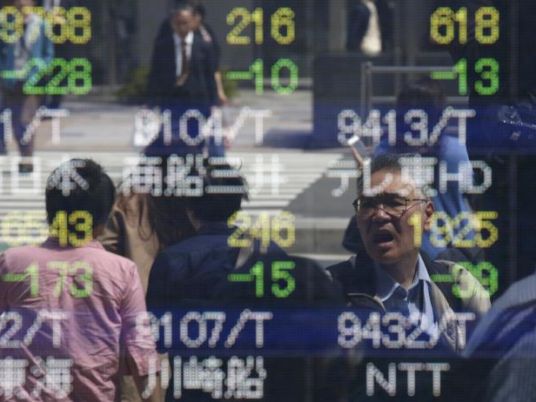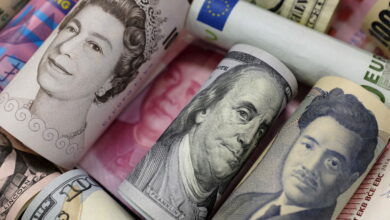
A 3 percent plunge in the Tokyo stock exchange and falls in European banking shares added to a gloomy global financial mood on Monday, pushing oil prices lower and the dollar to an 18-month low against the yen.
With trading thinned out by holidays in London and many Asian economies, a solid read of manufacturing sentiment in Germany drove the Frankfurt stock exchange around 1 percent higher. (.GDAXI)
That also helped France's CAC 40 (.FCHI) gain almost half a percent. But elsewhere the picture showed more of the concern over banking, poor economic growth and over-inflated asset prices that has gripped financial markets for much of this year.
Brent crude fell more than 1 percent LCOc1 to $46.78 a barrel while the European banking index .SX7E lost 0.6 percent. MSCI's broadest index of Asia-Pacific shares outside Japan .MIAPJ0000PUS was down 0.3 percent.
The yen, which tends to gain when Japanese and global market investors get worried about growth, reached 106.14 yen per dollar in early Asian trade before steadying on the day.
Last week was the yen's best since the 2008 financial crisis, thanks largely to a Bank of Japan policy meeting that gave no hint of further efforts to stimulate a long-moribund economy with more outright money-printing.
"A lot of people are still talking about Japan," said Thu Lan Nguyen, a strategist with Germany's Commerzbank.
"The BOJ are creating the impression that they will always react too late to deflationary risks. Now that they have disappointed, I think it would take something really new to change the market's mind on the yen."
Adding to the subdued sentiment, a survey released on Sunday showed that activity in China's manufacturing sector expanded for the second month in a row in April but only marginally, raising doubts about the sustainability of a recent pick-up in the economy.
Australian shares fell 0.2 percent after disappointing results from Westpac Banking Corp (WBC.AX).
Australia's central bank board will meet for a policy review on Tuesday and is widely expected to keep its cash rate at a record low of 2.0 percent, though some economists expect a cut.
Markets in Hong Kong, China, Taiwan, Singapore and Malaysia were closed on Monday. Japan is in the middle of its Golden Week series of holidays and markets there will be closed on Tuesday, Wednesday and Thursday of this week.
Investors have also turned broadly negative on the dollar in the past two months, worried that the U.S. Federal Reserve will be unable to raise interest rates this year. A fall to a 6-1/2 month low of $1.1484 against the euro (EUR=) bode ill for the run-in to payrolls data on Friday. The dollar index of its strength against a basket of six rival currencies, fell 0.2 percent to 92.899 .DXY.
"The start of the new month does not mean a new trend. The technical tone of the dollar is weak," Marc Chandler, global head of currency strategy at Brown Brothers Harriman in New York, said in a note to clients.
"The Federal Reserve acknowledges the continued improvement in the labor market. The problem is that it has not translated to stronger consumption, and business investment remains soft."




